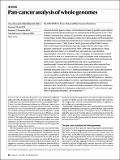Files in this item
Pan-cancer analysis of whole genomes
Item metadata
| dc.contributor.author | The ICGC/TCGA Pan-Cancer Analysis of Whole Genomes Consortium | |
| dc.date.accessioned | 2020-03-02T11:30:08Z | |
| dc.date.available | 2020-03-02T11:30:08Z | |
| dc.date.issued | 2020-02-06 | |
| dc.identifier | 266676201 | |
| dc.identifier | 269a8dd1-4337-43ed-b6c0-e20dd23037d4 | |
| dc.identifier | 85079038817 | |
| dc.identifier | 32025007 | |
| dc.identifier | 000529097800007 | |
| dc.identifier.citation | The ICGC/TCGA Pan-Cancer Analysis of Whole Genomes Consortium 2020 , ' Pan-cancer analysis of whole genomes ' , Nature , vol. 578 , no. 7793 , pp. 82-93 . https://doi.org/10.1038/s41586-020-1969-6 | en |
| dc.identifier.issn | 0028-0836 | |
| dc.identifier.other | ORCID: /0000-0002-7876-7338/work/70619084 | |
| dc.identifier.uri | https://hdl.handle.net/10023/19568 | |
| dc.description.abstract | Cancer is driven by genetic change, and the advent of massively parallel sequencing has enabled systematic documentation of this variation at the whole-genome scale1–3. Here we report the integrative analysis of 2,658 whole-cancer genomes and their matching normal tissues across 38 tumour types from the Pan-Cancer Analysis of Whole Genomes (PCAWG) Consortium of the International Cancer Genome Consortium (ICGC) and The Cancer Genome Atlas (TCGA). We describe the generation of the PCAWG resource, facilitated by international data sharing using compute clouds. On average, cancer genomes contained 4–5 driver mutations when combining coding and non-coding genomic elements; however, in around 5% of cases no drivers were identified, suggesting that cancer driver discovery is not yet complete. Chromothripsis, in which many clustered structural variants arise in a single catastrophic event, is frequently an early event in tumour evolution; in acral melanoma, for example, these events precede most somatic point mutations and affect several cancer-associated genes simultaneously. Cancers with abnormal telomere maintenance often originate from tissues with low replicative activity and show several mechanisms of preventing telomere attrition to critical levels. Common and rare germline variants affect patterns of somatic mutation, including point mutations, structural variants and somatic retrotransposition. A collection of papers from the PCAWG Consortium describes non-coding mutations that drive cancer beyond those in the TERT promoter4; identifies new signatures of mutational processes that cause base substitutions, small insertions and deletions and structural variation5,6; analyses timings and patterns of tumour evolution7; describes the diverse transcriptional consequences of somatic mutation on splicing, expression levels, fusion genes and promoter activity8,9; and evaluates a range of more-specialized features of cancer genomes8,10–18. | |
| dc.format.extent | 12 | |
| dc.format.extent | 23685909 | |
| dc.language.iso | eng | |
| dc.relation.ispartof | Nature | en |
| dc.subject | QH426 Genetics | en |
| dc.subject | RC0254 Neoplasms. Tumors. Oncology (including Cancer) | en |
| dc.subject | 3rd-DAS | en |
| dc.subject | SDG 3 - Good Health and Well-being | en |
| dc.subject.lcc | QH426 | en |
| dc.subject.lcc | RC0254 | en |
| dc.title | Pan-cancer analysis of whole genomes | en |
| dc.type | Journal article | en |
| dc.contributor.institution | University of St Andrews. School of Medicine | en |
| dc.contributor.institution | University of St Andrews. Statistics | en |
| dc.contributor.institution | University of St Andrews. Sir James Mackenzie Institute for Early Diagnosis | en |
| dc.contributor.institution | University of St Andrews. Cellular Medicine Division | en |
| dc.identifier.doi | https://doi.org/10.1038/s41586-020-1969-6 | |
| dc.description.status | Peer reviewed | en |
This item appears in the following Collection(s)
Items in the St Andrews Research Repository are protected by copyright, with all rights reserved, unless otherwise indicated.

